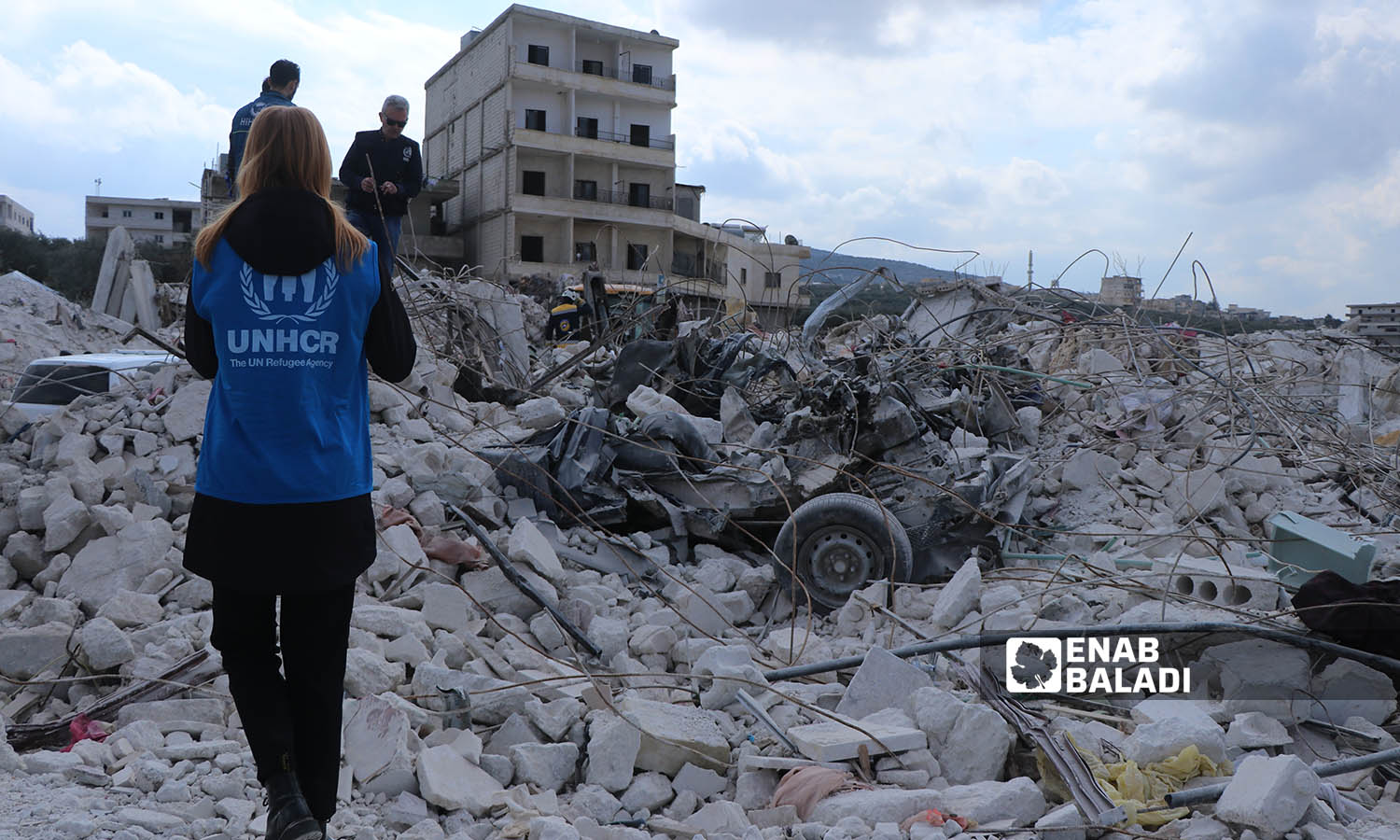



Enab Baladi – Anas al-Khouli
“Around a small wood-burning stove next to a camp that was established in response to the earthquake on the outskirts of Idlib city, I met with the owner of the house who, hours before, was asking me to increase the rent,” said Mazen al-Abboud, 43, indicating that the disaster is collective, and imposes a mutual appreciation for the conditions imposed on all residents of northern Syria, as he put it.
The house that al-Abboud, was renting was not destroyed as a result of the first earthquake, and the impact was limited to minor damages, which prompted the homeowner to ask him to raise the rent, taking advantage of the increased demand for houses in the city of Idlib, according to what al-Abboud told Enab Baladi.
“Successive aftershocks made the house uninhabitable and were sufficient to move me and my family to a camp, where I found the owner of the house had preceded me,” the man continued.
Since his displacement to Idlib, al-Abboud has suffered from the problem of house rents, which rise with every displacement movement, but the reality of the region and the destruction of thousands of buildings in moments made raising the rent an “illogical” idea, according to him.
According to what Enab Baladi monitored, house rents have increased significantly over the past few days, exacerbating the suffering of hundreds of displaced families affected by the earthquake.
The lease of the house in which al-Abboud lived expired at the end of last January, which made him face daily demands from the homeowner to raise the rent from $75 per month to $100.
“The owner of the house was refusing to sign the contract for more than six months in order to be able to raise the rent continuously,” says al-Abboud.
The earthquake was not a deterrent to not raising the rent, as the owner of the house continued his demands to raise it until al-Abboud had to vacate it because of the great damage left by the aftershocks.
Mahmoud Khadrawi is living a similar suffering after the damage to his house prompted him to search for an alternative house to rent in the city of Idlib.
After days of searching and suffering in the emerging camps, the young man found a small house consisting of two rooms, but the owner demanded that he pay $100 a month, Khadrawi said, pointing out that he was forced to pay $100 divided into a deposit amount and a commission for the real estate office.
The owner of one of the real estate offices in Idlib, Abdul-Rahman Dahneen, told Enab Baladi that the demand for homes doubled after the earthquake in the city of Idlib, which significantly raised rents.
Despite the decrease in the demand for homes due to the continuing aftershocks and the fears of families to stay in the buildings, especially the multi-story ones, the rents did not decrease, according to Dahneen.
The rate of rent increase is estimated at 25% compared to what it was before the earthquake, according to Dahneen.
In turn, the Council of Ministers of the Syrian Salvation Government (SSG) issued, on February 14, a decision to extend the lease contracts documented by the notary public and not documented at the end of next July.
It is also prohibited to evict the tenant or raise the rent until the same date, to prevent cases of exploitation and to maintain the stability of the residents, according to the text of the decision.
After the earthquake disaster, tenants’ fears of homeowners’ exploitation and rising rents increased, especially in light of the absence of laws regulating rents, and the dependence of homeowners in setting prices on demand, according to a poll conducted by Enab Baladi.
The demand for Arabic (ground) houses, farms, and apartments on the lower floors increased, while the demand for multi-story houses decreased after the continuation of the aftershocks.
The owner of a real estate office, Ibrahim Me’mar, told Enab Baladi that the demand for homes was not limited to the people displaced towards the city due to the earthquake, as many Idlib residents were forced to search for homes for rent after their homes were damaged in the earthquake.
Me’mar added that some people are afraid to stay on high floors at the present time, but the fear of an impending housing crisis prompted them to rent a house, while they decided to stay in shelters and tents temporarily.
This comes in light of the displacement of more than 6,158 families from the various earthquake-affected areas to the city of Idlib, the official spokesman for the Idlib City Council, Firas Alloush, told Enab Baladi.
Alloush pointed out the difficulty of conducting an accurate count of the number of families at the present time.
He added that the Council created five temporary shelters in the first days of the earthquake, but the continuation of aftershocks doubled the number of affected families and forced work to establish more centers.
Idlib suffers from overcrowding, which imposes additional difficulties on its residents, while there are no clear statistics on its population due to its overlap with areas of the northern countryside of Aleppo.
The overcrowding crisis worsened after the earthquake disaster, which made the city of Idlib the destination of hundreds of earthquake-affected families.
The earthquake’s death toll in northwestern Syria reached a total of 2,274 and 12,400 injuries, with tens of thousands of families in need of shelter and medical treatment.
The Syria Civil Defense (SCD) rescue agency documented the collapse of more than 550 buildings, while more than 1,570 buildings were partially damaged, in addition to the cracking of thousands of buildings in the various areas hit by the earthquake.
if you think the article contain wrong information or you have additional details Send Correction